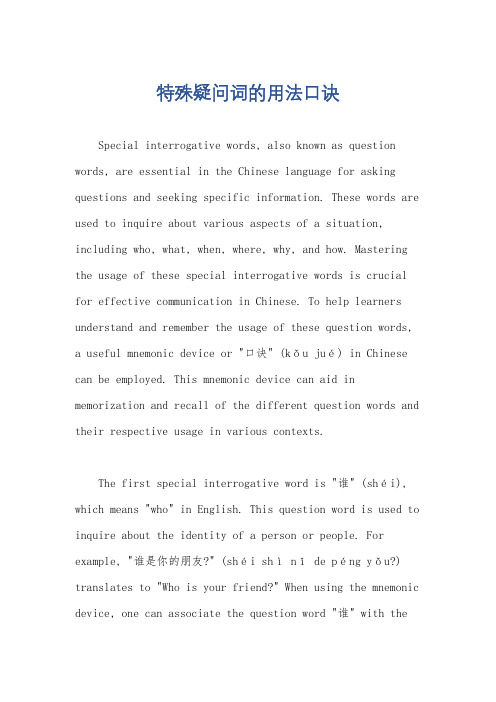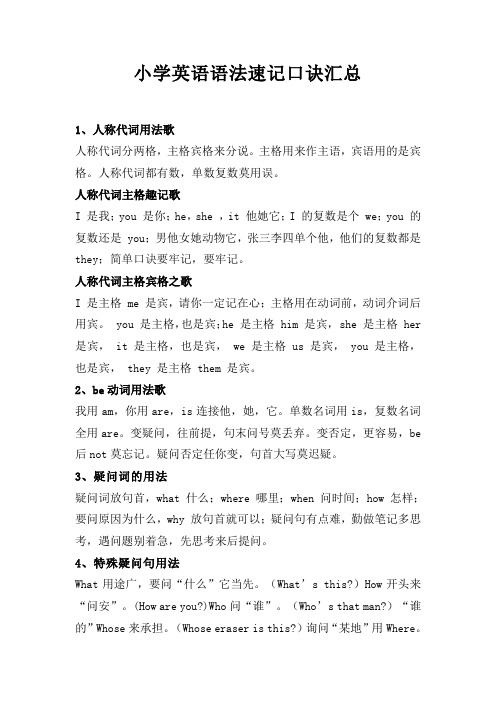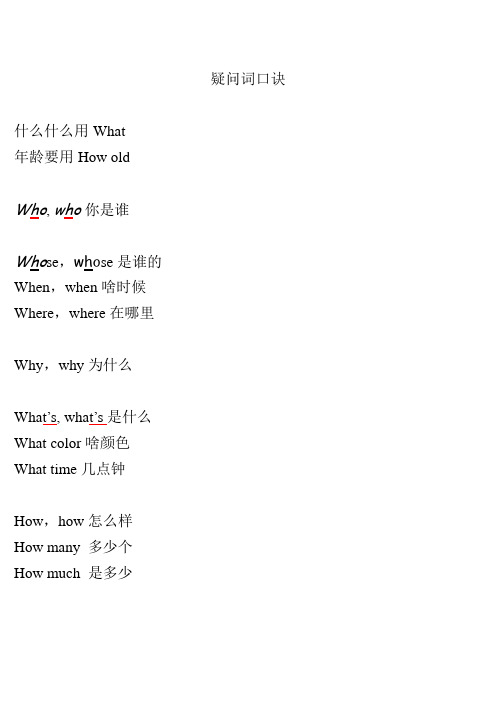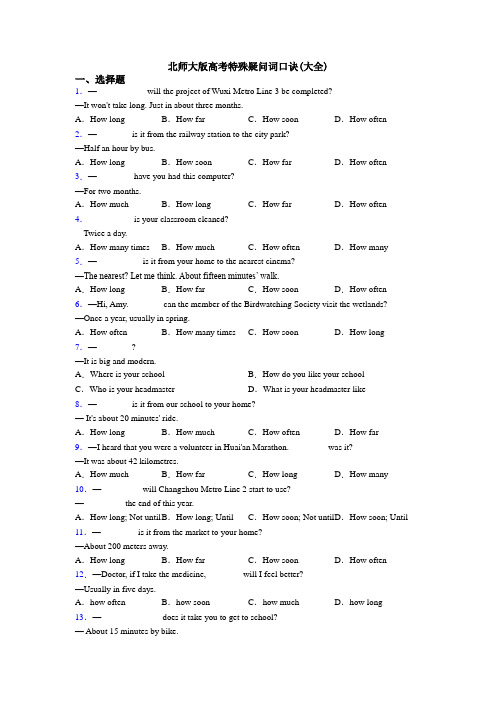特殊疑问词用法歌谣
8个特殊疑问词口诀

8个特殊疑问词口诀
1. What
What是最常用的疑问词,表示“什么”的意思。
它的口诀是:“What”是“什么”的意思,问名词和事物的情况。
2. Who
Who用来询问人,表示“谁”的意思。
它的口诀是:“Who”是“谁”的意思,问人的姓名和身分。
3. Where
Where表示“在哪里”,用来询问地点。
它的口诀是:“Where”是“在哪里”,问地点和位置的事情。
4. When
When表示“什么时候”,用来询问时间。
它的口诀是:“When”是“什么时候”,问时间和日期的情况。
5. Why
Why表示“为什么”,用来询问原因。
它的口诀是:“Why”是“为什么”,问原因和缘由的事情。
6. How
How表示“如何”,用来询问方式和方法。
它的口诀是:“How”是“如何”的意思,问方式和方法的情况。
7. Which
Which表示“哪一个”,用来询问选择。
它的口诀是:“Which”是“哪一个”,问选择和比较的事情。
8. Whose
Whose表示“谁的”,用来询问所有权。
它的口诀是:
“Whose”是“谁的”,问所有权和归属的情况。
以上是8个特殊疑问词的口诀,希望大家能够记住它们,灵活运用。
特殊疑问词的用法口诀

特殊疑问词的用法口诀Special interrogative words, also known as question words, are essential in the Chinese language for asking questions and seeking specific information. These words are used to inquire about various aspects of a situation, including who, what, when, where, why, and how. Mastering the usage of these special interrogative words is crucial for effective communication in Chinese. To help learners understand and remember the usage of these question words, a useful mnemonic device or "口诀" (kǒu jué) in Chinese can be employed. This mnemonic device can aid in memorization and recall of the different question words and their respective usage in various contexts.The first special interrogative word is "谁" (shéi), which means "who" in English. This question word is used to inquire about the identity of a person or people. For example, "谁是你的朋友?" (shéi shì nǐ de péng yǒu?) translates to "Who is your friend?" When using the mnemonic device, one can associate the question word "谁" with theEnglish word "she" to help remember its meaning and usage.The second special interrogative word is "什么" (shén me), which means "what" in English. This question word is used to ask about an unspecified object, action, or situation. For example, "你喜欢吃什么水果?" (nǐ xǐ huān chī shén me shuǐ guǒ?) translates to "What fruit do you like to eat?" To remember the usage of "什么," one can associate it with the English phrase "what's more" to help recall its meaning and function in questions.The third special interrogative word is "哪里" (nǎ li), which means "where" in English. This question word is usedto inquire about a specific location or place. For example, "你家在哪里?" (nǐ jiā zài nǎ li?) translates to "Whereis your home?" When using the mnemonic device, one can associate the question word "哪里" with the English phrase "not here" to help remember its meaning and how it is usedin questions about location.The fourth special interrogative word is "什么时候"(shén me shí hou), which means "when" in English. Thisquestion word is used to ask about a specific time or period. For example, "你什么时候去旅行?" (nǐ shén me shí hou qù lǚ xíng?) translates to "When are you going on a trip?" To aid in remembering the usage of "什么时候," one can associate it with the English phrase "she wore" to help recall its meaning and function in questions about time.The fifth special interrogative word is "为什么" (wèi shén me), which means "why" in English. This question word is used to inquire about the reason or cause of something. For example, "你为什么生气了?" (nǐ wèi shén me shēngqì le?) translates to "Why are you angry?" When using the mnemonic device, one can associate the question word "为什么" with the English phrase "way she meant" to help remember its meaning and usage in questions about reasons or causes.The sixth special interrogative word is "怎么" (zěn me), which means "how" in English. This question word is used to ask about the manner or method of doing something. For example, "你怎么学习汉语?" (nǐ zěn me xué xí hànyǔ?) translates to "How do you study Chinese?" T o aid inremembering the usage of "怎么," one can associate it with the English phrase "zen mode" to help recall its meaning and function in questions about manner or method.In addition to the mnemonic device, practice and repetition are also crucial for mastering the usage of special interrogative words in Chinese. Learners can engage in conversations, ask and answer questions using these question words, and seek feedback from native speakers or language instructors to improve their proficiency. By integrating the mnemonic device with regular practice, learners can enhance their understanding and retention of the different special interrogative words and their respective usage in various contexts.Furthermore, learners can create personalized examples and scenarios using the special interrogative words to reinforce their understanding and application. By incorporating these question words into everyday conversations or written exercises, learners can solidify their knowledge and familiarity with the usage of special interrogative words. Additionally, learners can utilizemultimedia resources such as videos, podcasts, and online quizzes to further reinforce their understanding and usageof these question words in different contexts.Moreover, understanding the cultural and social nuances associated with the usage of special interrogative wordscan also enhance one's proficiency in Chinese communication. Different cultures and social settings may influence the choice and manner of using special interrogative words in conversations. By immersing oneself in Chinese culture, interacting with native speakers, and observing language usage in various contexts, learners can gain insights into the appropriate and natural use of special interrogative words in different social and cultural settings.In conclusion, the usage of special interrogative words in Chinese is essential for effective communication and inquiry. By employing mnemonic devices, engaging in regular practice, creating personalized examples, utilizing multimedia resources, and understanding cultural nuances, learners can enhance their proficiency in using these question words. Mastery of special interrogative words notonly facilitates effective communication but also enriches one's understanding of the Chinese language and culture. With dedication and perseverance, learners can successfully integrate these question words into their language repertoire and communicate with confidence in various Chinese-speaking environments.。
巧记经典歌诀 妙学特殊疑问句

巧记经典歌诀妙学特殊疑问句作者:卢爱龙来源:《初中生世界(初一年级)》2007年第11期把陈述句转换为特殊问句时,相当多的同学在疑问句的语序上或动词的变化上常出现毛病。
如果读了下面一首歌诀,也许会使你少遇麻烦:疑问词走前面,后面跟的是一般;be 动词要提前,情(态)、助动词也赶先;行为动词请不动,do 和does加在前;does 加在主语前,谓语动词变原形。
说明:◆一、二句的意思是:特殊疑问词像排头兵,总是走在队伍的最前面,其后再跟一个一般疑问句。
◆三、四句的意思是:如果陈述句中谓语部分含有be 动词(is, am, are)、情态动词(can, may, must …),或助动词(will…)变为疑问句时,就一定要把这个词提到主语前面去。
◆五、六句的意思是:如果谓语部分只有行为动词,那么这个行为动词不能提前,怎么办?根据需要在主语前、疑问词后加助动词do(does)。
例如:I study English for my motherland (祖国) .→Why + do + you + study English?◆七、八句的意思是:如果主语前加does, 谓语动词应还原成动词原形。
例如:Han Meimei cooks food for Li Ming’s coming.→Why+ does + Han Meimei cook food?把陈述句改为特殊疑问句的方法步骤可总结为口诀:“一代二抄三问号”;“一代二改三提四问号”。
口诀中的“一、二、三、四”均表示步骤,而不表示次数。
◆“一代二抄三问号”是用于划线部分是主语或修饰主语的定语提问的方法。
“一代”是指根据划线部分及全句的意义,选择适当的疑问词代替划线部分;“二抄”指照抄原句划线部分以外的部分;“三问号”指最后将原来在句末的句号变为问号。
例如:Tom speaks Chinese well.(主语Tom用who代替)→Who speaks Chinese well ?一代二抄三问号My brother is a driver.(My 是主语brother的定语,用whose代替)→Whose brother is a driver ?一代二抄三问号◆ “一代二改三提四问号”是用于对非主语和非主语的定语提问的方法。
特殊疑问词

一、需要记牢的口诀1、问“什么”,用what;2、问“职业”,用what;3、问“颜色”,用what colour;4、问“星期”,用what day;5、问什么学科,用what subject;6、问几点用What’s the time?或What time is it?7、问“什么时候”,用when;8、问“身体状况”,用how;9、问“方式”,用how;10、问“年龄”,用how old;11、问“多少”,用how many+可数\how much+不可数;12、问"价钱”用how much13、问“谁”用who;14、问“谁的”,用whose;15、问“地点哪里”,用where;16、问“原因”,用why;17、问“哪一个”,用which ;二、对划线部分提问(一)我们知道对划线部分提问就要涉及到一个特殊疑问句,而特殊疑问句的构成就是特殊疑问词加上一般疑问句的形式。
1、确定疑问词。
确定划线部分是提问什么的,就用相应的疑问词写在句首(what 、when、 how、where、who、which、whose等)。
2、变陈述句为一般疑问句。
我们可以将陈述句变一般疑问句疑问句分为两种情况:(1)对含有be动词(am\is\are\was\were)、情态动词(can\will\would\could等)的句子,变为一般疑问句时我们要把这样的词直接提前。
例如:① Lucy can write articles very well.——Can Lucy write articles very well ?② They were late for the meeting yesterday.——Were they late for the meeting yesterday?③ Mary has been in China for three weeks.——Has Mary been in China for three weeks?(2)对不含be动词,也不含情态动词的句子,要借助于助动词(do\does\did\has\have\had)等变成一般疑问句。
特殊疑问句

特殊疑问句对划线部分进行提问,即针对句子中的某一成分提出问题。
实质上是把一个陈述句变成一个特殊疑问句的过程一、对划线部分进行提问可分四步进行:第一步,找出特殊词,代替划线部分。
(what when how where who which whose等)第二步,把原句变成一般疑问句(划线部分是主语或主语的定语除外)。
第三步,特殊词加上一般疑问句,划线部分省略。
第四步,归纳分析,写出正确答案。
歌谣:一找,二变,三省略,四归纳。
例1 That's a book .(1) 找出what代替a book。
(2) 变疑问句:Is that a book?(3) What + Is that? 省略a book (4) What is that? 归纳例2 The pen is on the desk .(1)找出Where代替on the desk 。
(2)变疑问句:Is the pen on the desk?(3)Where + is the pen? 省略on the desk(4) Where is the pen? 归纳单词意思用法when 什么时间问时间who 谁问人whose 谁的问主人where 在哪里问地点which 哪一个问选择why 为什么问原因what 什么问东西what time 什么时间问时间what colour 什么颜色问颜色what about …怎么样问意见what day 星期几问星期what date 什么日期问具体日期how …怎么样问情况,身体how old 多大问年龄how many 多少问数量how much 多少问价钱how about …怎么样问意见疑问词(What)+ 一般疑问句(其中谓语动词要用do 的相对应形式代替, 省略掉宾语)1 对物进行提问用what例1 That's a book .(1)找出what代替a book。
(2)变疑问句:Is that a book ?(3)What + Is that? 省略a book (4)What is that? 归纳2 对前面出现了name的人名提问用what例My name is Jim . (Jim 划线)What is your name?4 对地点提问用where 。
小学英语语法速记口诀歌

小学英语语法速记口诀汇总1、人称代词用法歌人称代词分两格,主格宾格来分说。
主格用来作主语,宾语用的是宾格。
人称代词都有数,单数复数莫用误。
人称代词主格趣记歌I 是我;you 是你;he,she ,it 他她它;I 的复数是个 we;you 的复数还是 you;男他女她动物它,张三李四单个他,他们的复数都是they;简单口诀要牢记,要牢记。
人称代词主格宾格之歌I 是主格 me 是宾,请你一定记在心;主格用在动词前,动词介词后用宾。
you 是主格,也是宾;he 是主格 him 是宾, she 是主格 her 是宾, it 是主格,也是宾, we 是主格 us 是宾, you 是主格,也是宾, they 是主格 them 是宾。
2、be动词用法歌我用am,你用are,is连接他,她,它。
单数名词用is,复数名词全用are。
变疑问,往前提,句末问号莫丢弃。
变否定,更容易,be 后not莫忘记。
疑问否定任你变,句首大写莫迟疑。
3、疑问词的用法疑问词放句首,what 什么;where 哪里;when 问时间;how 怎样;要问原因为什么,why 放句首就可以;疑问句有点难,勤做笔记多思考,遇问题别着急,先思考来后提问。
4、特殊疑问句用法What用途广,要问“什么”它当先。
(What’s this?)How开头来“问安”。
(How are you?)Who问“谁”。
(Who’s that man?)“谁的”Whose来承担。
(Whose eraser is this?)询问“某地”用Where。
(Where is her cat?)“哪一个”Which句首站。
(Which one?)5、祈使句用法祈使句,祈使句,请求、命令或建议。
主语是you常省去,动词原形开头记。
否定形式要注意,句首要把Don’t加。
要讲客气用please,句首句末没关系。
6、动词加-s或-es方法歌诀动词三单现在式,一般词尾加-s。
s, x, ch, sh在词尾,直接加上-es。
小学英语疑问词口诀

4、日常生活中我们应该如何减少垃圾的数量?Why,why为什么
答:当地球运行到月球和太阳的中间,如果地球挡住了太阳射向月球的光,便发生月食。What’s, what’s是什么
What color啥颜色
What time几点钟
6、蚜虫是黄色的,在植物的嫩枝上吸食汁液,每个蚜虫只有针眼般大小,在10倍放大镜下我们可以看清它们的肢体。How,how怎么样
How many多少个
How much是多少
9、物质的变化一般分为物理变化和化学变化。化学变化伴随的现象很多,最重要的特点是产生了新物质。物质发生化学变化的过程中一定发生了物理变化。
6、二氧化碳气体有什么特点?
16、空气是我们生命中生时每刻都需要的地球资源,大气污染影响着我们的健康,如大气中的飘尘易使呼吸系统发生病变。减少废气和废物排放是控制大气污染最根本的办法。Here,here是这里
There,there是那里
Where’s,where’s在哪里
答:水分和氧气是使铁容易生锈的原因。疑问词口诀
1、月球是地球的卫星,ቤተ መጻሕፍቲ ባይዱ球围绕着地球运动,运动的方向是逆时针方向。什么什么用What
年龄要用How old
一、填空:Who,who你是谁
9、在17世纪,人们发现把两个凸透镜组合起来明显提高了放大能力,这就是早期的显微镜。Whose,whose是谁的
When,when啥时候
北师大版高考特殊疑问词口诀(大全)

北师大版高考特殊疑问词口诀(大全)一、选择题1.—___________ will the project of Wuxi Metro Line 3 be completed?—It won't take long. Just in about three months.A.How long B.How far C.How soon D.How often 2.—________is it from the railway station to the city park?—Half an hour by bus.A.How long B.How soon C.How far D.How often 3.—________ have you had this computer?—For two months.A.How much B.How long C.How far D.How often 4.---________ is your classroom cleaned?---Twice a day.A.How many times B.How much C.How often D.How many 5.—__________ is it from your home to the nearest cinema?—The nearest? Let me think. About fifteen minutes’ walk.A.How long B.How far C.How soon D.How often 6.—Hi, Amy.________can the member of the Birdwatching Society visit the wetlands?—Once a year, usually in spring.A.How often B.How many times C.How soon D.How long 7.—________?—It is big and modern.A.Where is your school B.How do you like your schoolC.Who is your headmaster D.What is your headmaster like8.—________is it from our school to your home?— It's about 20 minutes' ride.A.How long B.How much C.How often D.How far9.—I heard that you were a volunteer in Huai'an Marathon. ________ was it?—It was about 42 kilometres.A.How much B.How far C.How long D.How many 10.—_________ will Changzhou Metro Line 2 start to use?—_________ the end of this year.A.How long; Not until B.How long; Until C.How soon; Not until D.How soon; Until 11.—________ is it from the market to your home?—About 200 meters away.A.How long B.How far C.How soon D.How often 12.—Doctor, if I take the medicine, ________will I feel better?—Usually in five days.A.how often B.how soon C.how much D.how long 13.— _____________ does it take you to get to school?— About 15 minutes by bike.A.How far B.How long C.How many D.How old 14.—________ do you go to visit your grandparents?—At least twice a month.A.How often B.How long C.How many D.How old 15.—________ do your parents come to visit you in the US, Tom?—Once a year.A.How often B.How long C.How soon D.How far 16.— ________ is it from your home to the park?—It’s about ten minutes’ walk.A.How often B.How far C.How long D.How soon 17.—________ do you read Duowei Reading books, Jack?—Once a week.A.How much B.How often C.How long D.How soon 18.—A nice T-shirt! ________ is it?—It’s 50 yuan.A.How long B.How far C.How much D.How old 19.—________ is it since the Communist Party of China (中国共产党) was founded?— Ninety-nine years. It’s her 100th birthday next year.A.How often B.How long C.How soon D.How many 20.—_______ will the COVID-19 outbreak be over?—No idea, but Mr Zhong Nanshan said, “There’s still the possibility that it could end in June.”A.How long B.How soon C.How far D.How often 21.— will she stay here?— For .A.How soon, one hour and a half B.How long, one and a half hoursC.How soon, one and half hours D.How long, one hour and half22.—________ do you go to the school library?—Twice a week.A.How long B.How often C.How soon D.How much 23.—Millie, ________ are you reading?—Camel Xiangzi, by the famous Chinese writer, Lao She.A.who B.how C.where D.what24.—________ do you play basketball with your friends?— Only once a week.A.How long B.How much C.How soon D.How often 25.Why not ________ an English club to practice _________ English?A.join; speaking B.to join; speaking C.join; to speak D.to join; to speak 26.—Excuse me, ____ is Xuefeng Park from the hotel?—It's about twenty minutes by bus.A.how much B.how soon C.how far D.how often 27.-_______________ can you get to the airport?-In about 30 minutes. I'm on the way.A.How soon B.How long C.How much D.How often 28.-___________ have you worked here?-For just one month.A.How often B.How long C.How soon D.How much 29.一 ________ do you check the oil?一About every 5,000 km.A.How far B.How long C.How much D.How often 30.— are you handing out the leaflets for?—To ask people to care more about the left-behind children.A.How B.Why C.What D.Who 31.—________ does May look like?—She is a pretty girl with big bright eyes and long straight hair.A.How B.What C.Which D.Who 32.---________is it from the Children's Palace to Nanjing South Railway Station, Tom? --- About 10 minutes' ride by busA.How soon B.How long C.How far D.How much 33.— will the project of high-speed railway connecting Xuzhou to Lianyungang be completed?—In about two years.A.How long B.How far C.How soon D.How often34.—_______have you studied in this school?—For nearly three years.A.How often B.How far C.How much D.how long 35.—I went from a school desk to a ship in my teens.—_________ days would you be at sea? Homesick?A.How long B.How many C.How much D.How soon 36.— ________ orange juice does she need?— Just a little.A.How much B.How long C.How many D.How far 37.—Bob, ________ can you have your product ready?—It’s hard to say. I’m still waiting for the final design.A.how long B.how soon C.how often D.how far 38.— ________ is it from your home to the bank?—About ten minutes’ walk.A.How often B.How far C.How long D.How much 39.—________ is it since the Party of China was founded?—It’s her 100th birthday this year. Got it?A.How often B.How soon C.How long D.How old 40.–Mr Black, _______ will the parents’ meeting last?-It’s hard to say. Maybe one hour more.A.how long B.how much C.how far D.how often【参考答案】一、选择题1.C【详解】句意:——无锡地铁三号线工程将在多久完成?——不会花很长时间。
